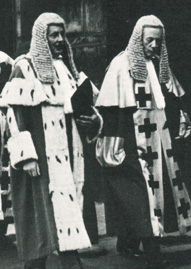Search
Democracy Links
Member's Off-site Blogs
faulty powers .....

Preferential treatment of judges under the Baillieu government's plans for an anti-corruption commission has come under attack from Victoria's powerful police union and a key integrity group.
Under the government's plans, the new watchdog will be banned from publishing reports on corrupt judges.
Police Association secretary Greg Davies told The Age it was unfair to give judges such protection while police were singled out for tougher scrutiny. ''Why would they be treated differently from anyone else in the public sector if they are accused of corruption? We are either playing footsies or we are playing for real,'' Mr Davies said.
The special provisions for judges have also been criticised by the Accountability Round Table, a group of academics, lawyers and others dedicated to enhancing transparency in government. ''There should be no basis for … treating judges of any Victorian court differently from other public officials,'' said spokesman David Yencken.
The Age understands the special treatment of judges followed sustained behind-the-scenes pressure from the ranks of Victoria's top judges - including Chief Justice Marilyn Warren - who were worried the new body would undermine their independence.
The special provisions for judges have won qualified support from free speech lobby Liberty Victoria. ''The independence of the judiciary is absolutely central to the way we are governed,'' said group president Spencer Zifcak.
The second of three pieces of legislation to establish the commission was passed in the upper house late last night without resistance from Labor.
Publicly, Labor says it needs to see the third piece of legislation before it can fully understand where the government is heading. Privately, Labor sources have told The Age the party believes the commission is likely to fail, and prove a handy political target ahead of the 2014 state election.
Labor MPs also privately concede that the limited scope of the proposed watchdog - which will prevent it from investigating the types of misconduct claims that dogged Labor in power - is a relief to MPs.
Under the second bill, the watchdog is prohibited from publishing findings of corruption against judges in reports to Parliament. And in contrast to its probes into other public sector employees, the commission must notify a judge's superior when starting an investigation.
The bill also says that if the anti-corruption commissioner is less senior than the judge being investigated, the probe must be taken over by a former judge or magistrate of at least equal rank.
It also gives the commission broader scope to investigate police officers as opposed to Victoria's other 240,000 public sector employees - including MPs. Mr Davies said he had pressed the government to treat police equally. ''There is not much, if any, serious corruption in the police force in Victoria.''
The government gave special consideration to the position of judges after receiving constitutional advice that it must ensure the separation of powers between the executive, judicial and legislative arms of government. ''We were very conscious that judges have a very significant role in the three tiers of government,'' said Andrew McIntosh, the minister responsible for establishing an anti-corruption commission. ''The process we have gone through with judges recognises that significant role they play.''
The Victorian model would give greater protection to judges than the comparable systems in Queensland and NSW.
A spokesman for Mr McIntosh said if the commission found a judge corrupt it would refer the matter to the police or the proposed Judicial Complaints Commission. The public would find out about the corrupt judge as he or she went through the judicial system ''just like any other member of the public''.
Chief Justice Warren declined to comment on her role in defending the judiciary's independence or why judges should be treated differently in the bill.
In an article in December, she said the community should take comfort because ''there had never been a case of a corrupt judge in Victoria''
- By John Richardson at 25 Apr 2012 - 8:28am
- John Richardson's blog
- Login or register to post comments
Recent comments
1 hour 16 min ago
11 hours 26 min ago
13 hours 18 min ago
13 hours 20 min ago
14 hours 25 min ago
17 hours 45 min ago
1 day 1 hour ago
1 day 1 hour ago
1 day 2 hours ago
1 day 2 hours ago